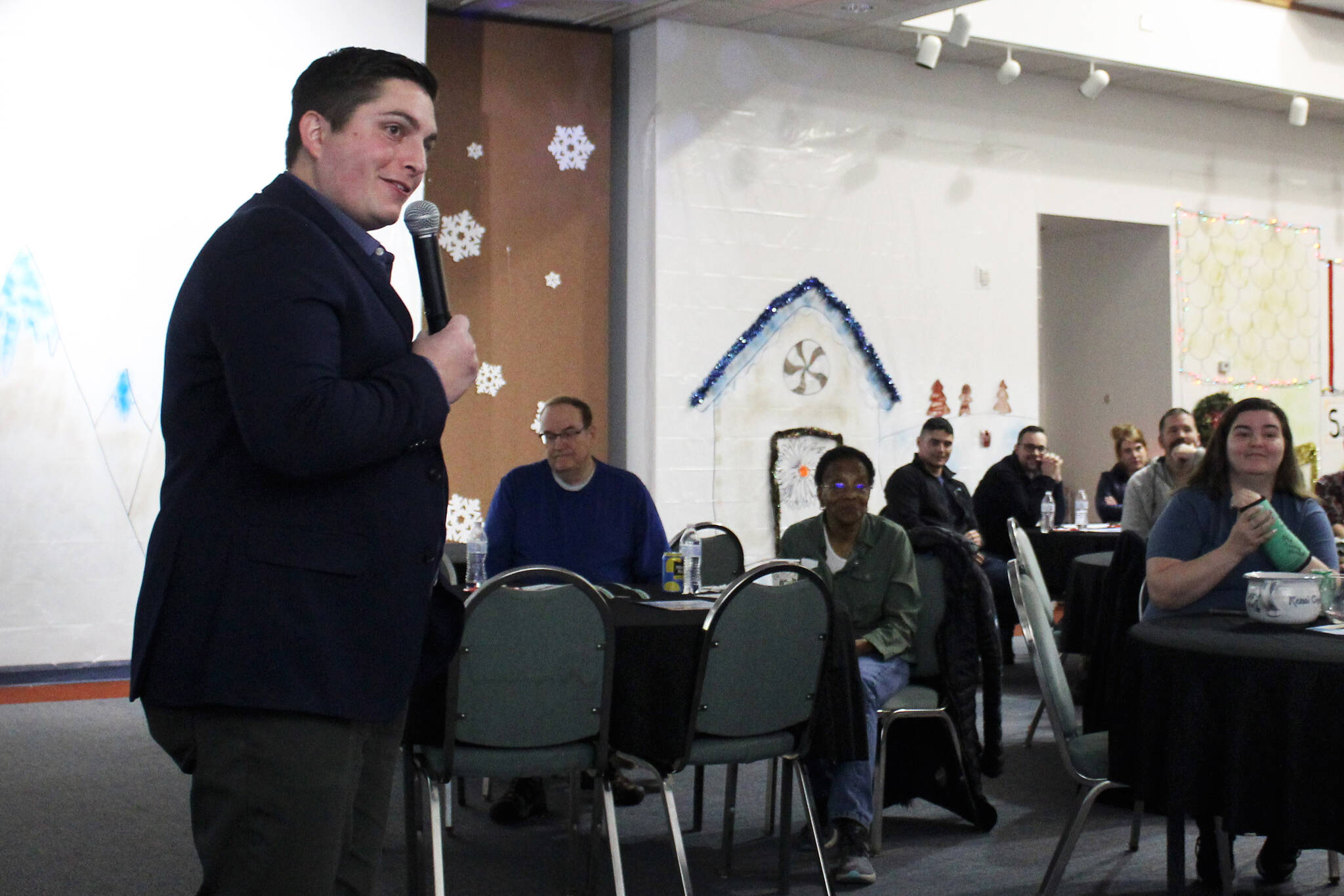With a little over a month until the start of the Alaska Legislature’s next regular session, freshman lawmaker Justin Ruffridge briefed attendees at a Wednesday chamber of commerce luncheon about what he’s already accomplished and his predictions for what will be the top issues awaiting legislators in Juneau.
Ruffridge has represented District 7, which includes Kenai and Soldotna, in the Alaska House of Representatives since January, and was elected to the seat last November. He is a Soldotna-based pharmacist who last session sponsored two pharmacy-related bills that Gov. Mike Dunleavy signed into law in Soldotna this summer.
Informing most of the work lawmakers do in Juneau each session, Ruffridge told attendees Wednesday, are Alaska’s budget woes. He issued an open call to the room for suggestions on how the state should be addressing its budget shortfall, which he said results from the State of Alaska not having enough revenue to cover its bills.
“In the State of Alaska, we don’t have a stable source of revenue,” Ruffridge said. “The majority of our revenue comes from oil and gas taxes and as the price of oil goes, so goes the State of Alaska. So, the question … is when there’s a request for more funding, where do we think that funding should come from?”
He said he sees three options available. The state could either make Alaska Permanent Fund dividends smaller, institute some type of statewide tax, cut the state budget by about 25% or try some combination of the three.
In recent years, he said the state has been drawing from the earnings reserve of the Alaska Permanent Fund, which is why Alaskans have sometimes received smaller PFD checks. Dunleavy also tried the 25% budget reduction method shortly after being elected governor, Ruffridge said, which was met with widespread pushback from Alaskans who lost state services.
It’s those larger questions about Alaska’s financial future, Ruffridge said, that are baked into the question of whether or not the state should increase the amount of money the state gives K-12 school districts, also called the base student allocation. School districts heavily lobbied for an increase to that amount.
Aside from a $30 increase approved last session, Alaska’s BSA has remained flat since 2017. By not adjusting the amount to account for inflation, school districts have said state funding for K-12 education has effectively decreased during that time.
“It’s going to be a real fight,” he said.
Ruffridge said his priority as he considers the question of school funding is making sure districts are able to meet their basic needs.
“My intent is to try to solve what I would call the immediate need,” he said. “How will we get back to … being able to offer some services that we all know and love and make sure that we have access to … smaller class sizes? Let’s get back to the status quo.”
Ruffridge also co-chairs the House Education Committee and has sponsored bills that aim to increase the number of students who take advantage of the Alaska Performance Scholarship, and another that would more closely align the amount of money school districts receive per home-school student to the amount districts receive for brick and mortar students.
Commercial fishing is another issue Ruffridge started working on last session; his House Bill 195 is a companion to Sen. Jesse Bjorkman’s east side setnet fishery buy-back bill. That legislation would establish a lottery-style, voluntary permit buy-back program for Cook Inlet’s east side setnet fishery.
The legislation was long championed by then-Sen. Peter Micciche with the goal of reducing tensions between the fishery and other user groups by reducing the amount of fishing gear in the water. Permits successfully retired through the program would result in the closure of the fishing grounds associated with the permit to fishing.
Ruffridge fielded criticisms of the bill, such as that it provides a bailout for fishermen who initially received their permits for free and singles out a specific struggling group for relief. In response, he said that limits on the fishery have essentially forced people to close their business, so there is an economic harm to those fishermen.
Further, Ruffridge said the legislation is as much about conservation of chinook salmon as it is about providing relief to commercial fishers. The central Kenai Peninsula, he said, has made a priority preserving the viability of local chinook salmon populations without assistance from operations like hatcheries.
“I think the buyback here in many cases is to try to say, ‘Let’s try to remove as many barriers to chinook salmon being in the river so that those entities that you’re talking about — the lodge owners, the guides, many other people who do make their living off of people trying to catch the elusive Kenai king — still have a business,” he said.
Cook Inlet will be the focus of lawmakers for a different reason during the upcoming session, Ruffridge said, as Alaska Railbelt communities look for solutions to a pending shortage of natural gas from the field’s active basins. He expects energy security will be lawmakers’ top priority when they convene in Juneau next month.
The Alaska Department of Natural Resources reported in a 2022 Cook Inlet gas forecast that demand for the resource could outpace supply as soon as 2027 without new development in the basin. Gov. Mike Dunleavy has already announced his plans to introduce legislation that would lower the royalties for oil and gas companies operating in the area as an incentive.
Alaska’s state lawmakers will return to Juneau for the Alaska Legislature’s next regular session next month. The first day of the session is Jan. 16, 2024. More information about lawmakers and the bills they’re considering can be found at akleg.gov.
Reach reporter Ashlyn O’Hara at ashlyn.ohara@peninsulaclarion.com.
CORRECTION: A previous version of this story incorrectly stated the length of time for which Ruffridge has represented District 7. Ruffridge was elected to the seat in November 2022 and was sworn in in January.

